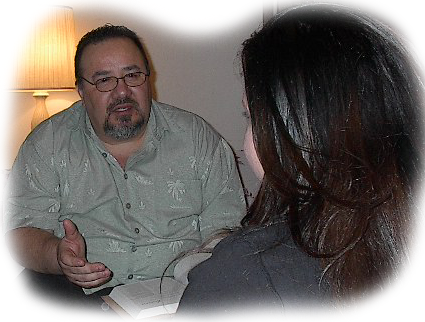 New counselors have one bad habit they must work on to become better counselors. They must learn not to get lost in the story. By this I mean that the counselor will get so focused on what the client tells them is going on, or that the counselor begins to side with one person over the other. In either case, the counselor has become less effective as of that moment. Good and healthy counseling requires that the counselor be objective when dealing with opposing points of view. When the counselors chooses sides, they are no longer the best counselor in the case. As well, when the counselor gets all focused in the client’s story, he or she is in danger of choosing sides, or at the very least, may start jumping to conclusions before he or she has all the needed data.
New counselors have one bad habit they must work on to become better counselors. They must learn not to get lost in the story. By this I mean that the counselor will get so focused on what the client tells them is going on, or that the counselor begins to side with one person over the other. In either case, the counselor has become less effective as of that moment. Good and healthy counseling requires that the counselor be objective when dealing with opposing points of view. When the counselors chooses sides, they are no longer the best counselor in the case. As well, when the counselor gets all focused in the client’s story, he or she is in danger of choosing sides, or at the very least, may start jumping to conclusions before he or she has all the needed data.
Getting lost in the story means that the counselor is so wrapped up in the details of the client’s complaint or arguments that the counselor loses sight of what is more important. The important thing is that counselors need to listen for clues and symptoms which will help them identify what the root problem may be. The goal of all counselors must always be to find out what is going on wrong with the client’s life, not just what the client says is wrong. This way the counselor can better help the client find the answers they actually need as compared to the answers they want.
 As well, when the counselor gets “lost in the story,” he or she limits themselves in scope as to what questions they will ask of the client. This is extremely important because if the counselor is already jumping to conclusion early on, they will not ask questions they need to ask to get data which will better help them to find the real problem, and therefore the real solution.
As well, when the counselor gets “lost in the story,” he or she limits themselves in scope as to what questions they will ask of the client. This is extremely important because if the counselor is already jumping to conclusion early on, they will not ask questions they need to ask to get data which will better help them to find the real problem, and therefore the real solution.
As an example, one counselor had a client who presented with the complaint that her husband was abusive and violent. The counselor, also a female who had suffered a bad relationship with a husband in her past, immediately began notifying the client of her legal options. As the counselor continued questioning the client, along the lines of the “abuse,” the client began to become uncomfortable. The counselor counseled the client that she should meet with a lawyer and consider divorce proceedings. The client responded negatively to the counselor, “I don’t want to lose my marriage!” The counselor was suddenly confused, “But … you told me that your husband was abusive to you?” “Yes, I mean, No,” responded the client, “He sometimes gets really angry, but he is not that bad.” “But, you said he hurt you,” responded the counselor. “Well, yea, he did push me, but that was after I started hitting him,” said the client. “You, were hitting him!?” asked the counselor, quite stumped, “Why?” “Because he was not listening to me,” said the client, now starting to cry. “oh,” said the counselor, now catching on to what was actually going on, “Do you mean that he was not listening to you, or not agreeing with you?” “Well, yea,” said the client sheepishly, “He was not agreeing with me, so I hit him.”
It is the responsibility of the counselor to stay on point. it would have been easy for the counselor above to quickly conclude that the husband was some mean ogre who needs to be dealt with immediately. Instead the counselor found that both persons were in the wrong. It is this important ability, that of paying attention to the details and searching for the real problem, which will actually help the client with their issues.
Staying on point means asking questions, even when you think you know the real problem. It is important for counselors to verify whether they actually have concluded correctly. Let me make the point clearer this way. When a client comes to a counselor the present a case. This means they explain their point of view on what they believe to be the problem. When a client presents they are making an argument. No, I don’t mean they are arguing, they are making an argument, sort of like a lawyer in a court setting. Counselors, in a manner of speaking, must become judges, which after hearing the arguments must make a concluding decision.
There are two types of arguments, deductive and inductive. The first refers to arguments made using facts which can be verified, and the latter refers to arguments which are based on opinion. Clients tend to argue inductively, their arguments are heavily colored by their emotions. Counselors have to wade through facts and opinions, stated and unstated assumptions, relevance, biases, personal perspectives, and the truth. All of this means that the counselor must pay attention. Not just to the client, but also to what, and how, the client says and does not say.
To come to correct conclusions, the counselor must understand premises. Premises supply the evidence on which an argument is based. For example, a client might argue that she believes her husband is having an affair. This is a premise. The counselor’s job is to verify the premise. This is done by asking the client questions which help to either confirm the premise or to prove it erroneous. In this example, the counselor might ask the client what evidence she has which cause her to come to the conclusion. Lets say she tells the counselor that she saw her husband speaking with a woman at work. The counselor would likely tell the client that this alone is not sufficient evidence to reach the conclusion her husband is having an affair. Then lets add that the client continues, “But, I have text of her contacting him on his cell!” The counselor reads the text and it reads, “Hi, Jack, thanks for your help, I appreciate it very much. I’ll see you tomorrow.” The counselor will ask the client, “what did she mean be ‘tomorrow?'” The client might answer, “They work at the same place, I think she was the woman with whom I saw him speaking.” The counselor would likely state that the evidence, so forth, still does not seem to imply the husband is having an affair. Realizing that the client’s argument is not supporting her premise, the counselor could then question her real reason for her fears.
If the counselor pays attention to the argument, and verifies or disproves the premise, then he or she will come to a more likely correct conclusion, and therefore a better means of helping the client. This may seem a bit involved, but for the counselor which wants to be the best counselor possible, learning new techniques and skills is valuable. I hope this may have encouraged you to take a course in Critical Thinking. It will be the best thing you can do to improve your communication skills as a counselor.







